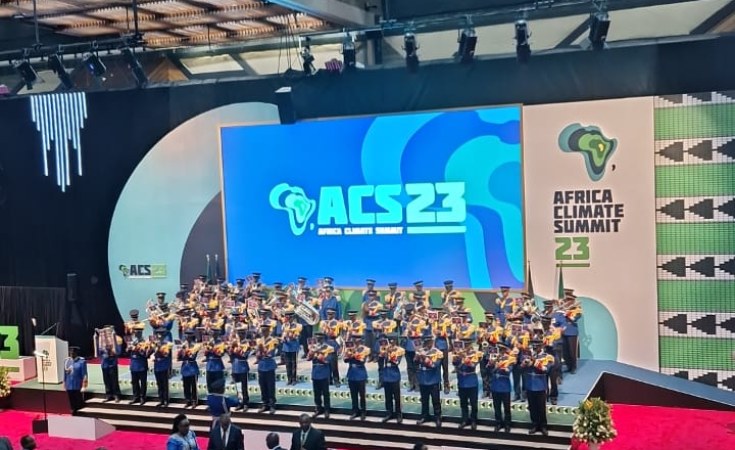Oakland, California — In the wake of the recent Africa Climate Summit, which convened in Nairobi from September 4-6, 2023, the world's attention was drawn to the pressing challenges facing the African continent as it grapples with the devastating effects of climate change.
Accounting for less than 4 percent of global emissions, Africa is owed a significant climate debt by historical polluters, yet has received only 12 percent of the US$300 billion in annual financing it needs to cope with climate-related challenges.
The three-day Summit culminated in the adoption of the Nairobi Declaration, which articulates the shared position of African countries as they prepare for the upcoming COP28 climate change. Reflecting the deep historical injustices that have left the continent disproportionately vulnerable to worsening climate shocks, the declaration calls for "a new financing architecture that is responsive to Africa's needs," including debt restructuring and relief, as well as a "carbon tax on fossil fuel trade, maritime transport and aviation, that may also be augmented by a global financial transaction tax."
However, these calls for justice ring hollow when examining the investments and initiatives actually prioritized at the Summit, revealing a striking paradox. During the gathering, the agenda primarily revolved around the expansion of carbon markets - a dangerous and false climate solution that opens up the continent to green colonialism and reinforces the status quo of North/South power imbalances.
Hundreds of millions of dollars were pledged to this extractive and speculative system, turning a blind eye to the fact that carbon offsets have spectacularly failed to reduce emissions and have a troubling history of triggering evictions, decimating livelihoods, and exacerbating environmental harm in Africa, as outlined in a recent report by the Oakland Institute.
In one of the event's most anticipated deals, investors from the United Arab Emirates (UAE) committed to purchase US$450 million worth of carbon credits from the Africa Carbon Markets Initiative (ACMI). Climate Asset Management - a joint venture of HSBC and climate investment firm Pollination - also announced a US$200 million investment in projects that produce ACMI credits.
Launched at COP27 by the Global Energy Alliance for People and Planet, Sustainable Energy for All, The Rockefeller Foundation, and UN Economic Commission for Africa, ACMI hands disproportionate control of Africa's carbon markets to wealthy countries and oil interests, allowing polluters to continue emitting with impunity while Africa supplies them with carbon credits. Instead of serving the interests of the African continent, the financial pledges made during the Summit threaten to exacerbate existing inequalities and further extractivism.
However, heads of state and leaders celebrated these investments, advancing the flawed belief that carbon markets represent a viable source of climate financing. Kenyan President William Ruto described carbon sinks as an "unparalleled economic goldmine," while European Commission President Ursula von der Leyen pitched "true carbon credits" as a "solution that would unlock huge resources for climate action in Africa."
US Special Presidential Envoy for Climate John Kerry similarly declared that "Africa needs a thriving carbon market as a tool to fight the climate crisis." Contrary to these assertions, carbon markets mainly benefit foreign developers and financial intermediaries - wealthy individuals, firms, and organizations based in the Global North - with host countries and local communities often only receiving a small fraction of the revenues generated.
While the Africa Climate Summit was dominated by false solutions, the breakthrough came in the form of the alternative Real Africa Climate Summit, which brought together over 500 civil society groups - showcasing the power and vibrancy of the African climate movement.
In response to the failings of the official Summit, civil society groups organized an alternative People's Assembly and March, which catalyzed conversations and collaboration among grassroots movements, farmer organizations, Indigenous communities, activists, and faith-based actors.
The outcome of this counter-mobilization is the African People's Climate and Development Declaration, which provides a vision for African climate action that is far more ambitious than the Nairobi Declaration. Centered around African solutions, climate justice, and a people-centered approach, the People's Declaration outlines the real solutions African leaders must demand at the upcoming COP28 and beyond.
These include a redefinition of development away from perpetual growth, people-centered renewable energy, agroecology and food sovereignty, ecosystem protection and restoration, a socially just transition away from fossil fuels, and the dismantling of transnational corporations' power.
Addressing the climate emergency cannot come at the expense of those who contributed the least to it. Nor can it be tackled with the same extractive and neocolonial system that created it in the first place.
As we move forward towards COP28 in Dubai, African nations must reject false climate solutions that surrender control over their natural resources to wealthy countries in the Global North.
Instead, African leaders must listen to the calls of civil society and prioritize genuine solutions that pave the way for a just transition and prioritize the well-being of African people.
Eve Devillers is a Research Associate at the Oakland Institute, an independent policy think tank bringing fresh ideas and bold action to the most pressing social, economic, and environmental issues of our time. www.oaklandinstitute.org
IPS UN Bureau


